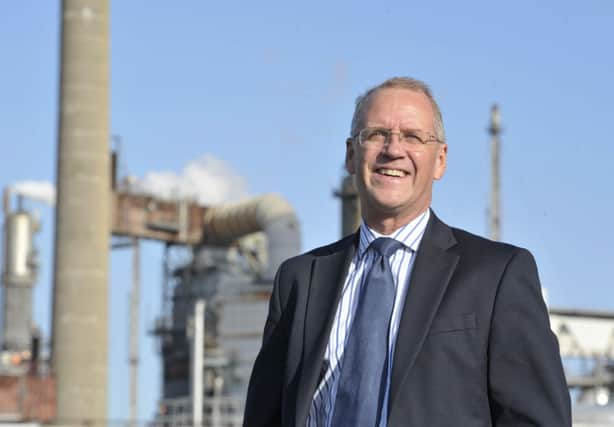Ineos in Grangemouth tell workers future is secure


In an internal memo to staff at the country’s biggest industrial site, John McNally, Ineos’ chief executive for Olefins and Polymers UK, said Grangemouth is safe for the next 15 years – but “not guaranteed” beyond this.
His comments follow a warning from Gary Haywood, chief executive of Ineos Upstream, at a Scotsman conference last week that the plant was unlikely to have a future without fracking. In his memo, which has been seen by The Scotsman, Mr McNally wrote: “You may have seen some coverage over the last couple of days in the press relating to onshore shale gas exploration and potential impacts on Grangemouth. I think that a number of things have been taken out of context. The reality is that we have at least 15 years of assured gas supply from the US starting in 2016, which assures the future of the business in the medium to long term. Predicting what happens after that is, of course, more difficult.”
Advertisement
Hide AdAdvertisement
Hide AdGrangemouth – with its giant oven “cracker” to break down gas – is to start shipping in cheap shale gas next year from the US. Shale gas is extracted by hydraulic fracturing – or fracking – which sees high-pressure water pumped into rocks more than a mile below the ground to release oil and gas locked inside.
Scotland has significant reserves of its own, but energy minister Fergus Ewing last month announced a moratorium on the procedure in Scotland as a result of environmental and health concerns.
The Ineos facility at Grangemouth, consisting of the oil refinery and petrochemical plant, is Scotland’s biggest industrial site. It employs about 1,300 staff and thousands more contract workers and came close to closure during a damaging industrial dispute in 2013.
Mr Haywood previously suggested it would be feasible to establish a shale industry in the UK “within three to five years”.
And he revealed the Grangemouth plant would begin shipping in cheap shale gas from the US next year – but warned this would not continue indefinitely. He added it was “unlikely” the cracker had a long-term future without developing an “indigenous source” of shale gas.
A spokesman for Ineos last night said US gas would “assure the site’s future in the medium term”.
“After this, the site will either have to try to renegotiate the US contracts or look for alternative ethane sources that are competitively priced,” he said. “In Ineos’s view, the best way to ensure the longterm success of Grangemouth, one of Scotland’s largest manufacturing businesses, would be to develop an indigenous shale gas industry.”
Unions last week reacted with anger to Mr Haywood’s warning, pointing out that Ineos received millions of pounds in taxpayers’ cash as part of the deal to keep the plant open last year.
Advertisement
Hide AdAdvertisement
Hide AdGreen MSP Alison Johnstone said yesterday: “Ineos should put all their research and skills into developing greener alternatives to their products. Regardless of where it comes from, shale gas is not the answer to our energy needs.”
But supporters insist Scotland should not miss out on the shale gas revolution which has seen energy bills plummet in the US to about a quarter of UK levels.
Scottish Conservative energy spokesman Murdo Fraser said: “It makes no sense for Grangemouth to depend on shale from the US while being denied the prospect of domestic supply.
“Scotland cannot afford to be left behind on this matter. We do not want to get to the stage in a few years’ time where the future of the plant is threatened again because of Scottish Government inaction today.”
The petrochemicals facility at Grangemouth makes more than two million tonnes of plastics every year. But as North Sea gas supplies run down, it has had to look elsewhere.
Ineos has already acquired more than 700 square miles of fracking exploration licences in central Scotland which have now been halted.
A report by the British Geological Survey last year indicated that Scotland’s midland valley is sitting on 80 billion cubic feet of shale gas – enough to meet the country’s demands for the next half century.
The concerns over fracking have centred on environmental concerns over the significant amounts of water that must be transported to the fracking site and claims, denied by the industry, that potentially toxic chemicals used may escape and contaminate the local water supply.
Advertisement
Hide AdAdvertisement
Hide AdThe Scottish Government has said the situation on fracking changed after a recent agreement on handing Holyrood new powers made it clear this would include licensing powers for onshore oil and gas.
Ministers said this gave them the opportunity to consider “the challenges, concerns and opportunities” around unconventional oil and gas in Scotland afresh.
Mr Ewing told MSPs last month a mass public consultation exercise will be undertaken to gauge Scottish public opinion.
Regulations and planning guidance will also be tightened up, while a public health assessment is to be carried out to address concerns the process can cause earthquakes and contaminate groundwater supplies.
FOLLOW US
SCOTSMAN TABLET AND MOBILE APPS